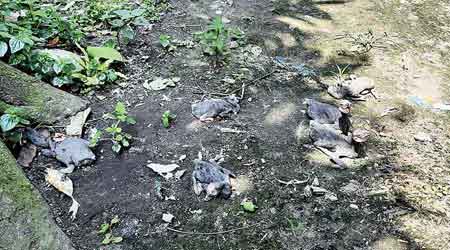The death of hundreds of egrets in a lower Assam town has prompted the state forest department to write to all deputy commissioners to “inform” urban and rural civic bodies in their districts to “consult” local forest officials before taking any step that may harm wildlife or any protected animals/birds.
Over 200 egret chicks died after their bamboo grove habitat in ward no. 1 of Tangla town in Udalguri district was partially destroyed following an order by the Tangla Municipal Board, sparking off not only widespread condemnation of the “inhuman act” but also raising questions about the awareness level of urban and rural civic bodies when it came to protection of wildlife/bird habitats in such areas.
Multiple FIRs, including two by the forest department, have been filed against municipal board executive member S. Das, who had served notices on June 8 to five residents of wards 1 and 2 to clear the bamboo groves nesting the egrets and their fledglings as their “droppings” were “creating unhygienic environment which may increase the risk of Covid-19 infection in the area”.
The role of board chairman Dilip Boro is also under the scanner.
Shajid Khan, a law student and a resident of ward no. 3 in Tangla, was the first to highlight the egret deaths on social media.
Principal chief conservator of forests (wildlife) Amit Sahai, who was directed to probe the “ unfortunate” incident, told The Telegraph that the department will be writing to all the deputy commissioners by Monday to apprise the town, municipal and panchayat bodies that they need to consult local forest officials before taking any decision regarding animal/bird habitats.
Egrets are listed under Schedule IV of the Wildlife Protection Act, 1972.
“Had the Tangla Municipal Board consulted the local forest officials, the egret deaths could have been avoided. There are ways to deal with wildlife/scheduled animals. To prevent a repeat, we will formally write to the deputy commissioners to apprise the elected civic bodies about our concern and what they need to do if a Tangla-like situation arises. All of us will have to work together to prevent a repeat,” Sahai said.
Tangla forest officials are also planning to hold awareness meetings with leading citizens, NGOs and government officials on the need to protect wildlife.
Conservationist Bibhab Kumar Talukdar of Guwahati told this newspaper that the recent incidents of bird deaths in Tangla and earlier in Rampur in Kamrup district reflect the need for wider awareness and orientation among the masses, including government officials, civic bodies, social and public leaders.
Awareness is required because Assam is “bestowed” with diverse wildlife and many of its cities, towns and villages “still house” many species of wild animals, he said.
Talukdar and other wildlife experts also questioned whether the municipal board has any proof that a bamboo grove or birds spread Covid-19.
In Guwahati alone, there are more than 130 species of birds and 44 species of wild mammals, according to a study by researchers of the animal ecology and wildlife biology lab, department of zoology, Gauhati University, Talukdar said.
“The misinformation sometimes spreads among masses, even servants now require wildlife and legal orientation. Dadara in Kamrup district is an important example where villagers have come forward to save hargila (greater adjutant stork) and the trees. It is not impossible to live in harmony, we need to have the right mindset,” said Talukdar, CEO of the wildlife NGO Aaranyak.
According to Talukdar and Golaghat-based environmentalist Apurba Ballab Goswami, Guwahati has elephants and leopards among big mammals besides large bird colonies. One can also find bat, duck, stork, butterfly, parrot and vulture habitats.
“There is an immediate need for an awareness drive among local elected bodies because they are often the first point of contact for local residents when they have a problem or a demand,” Goswami said.
Altogether 88 egret chicks have been rescued and sent to the Centre for Wildlife Rehabilitation and Conservation at Kaziranga, around 460km from Tangla.











